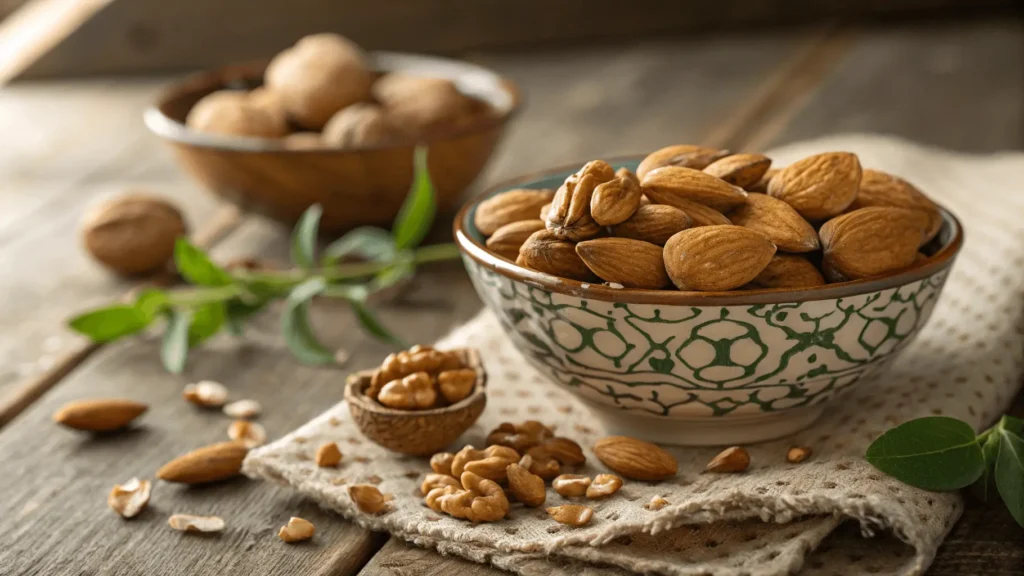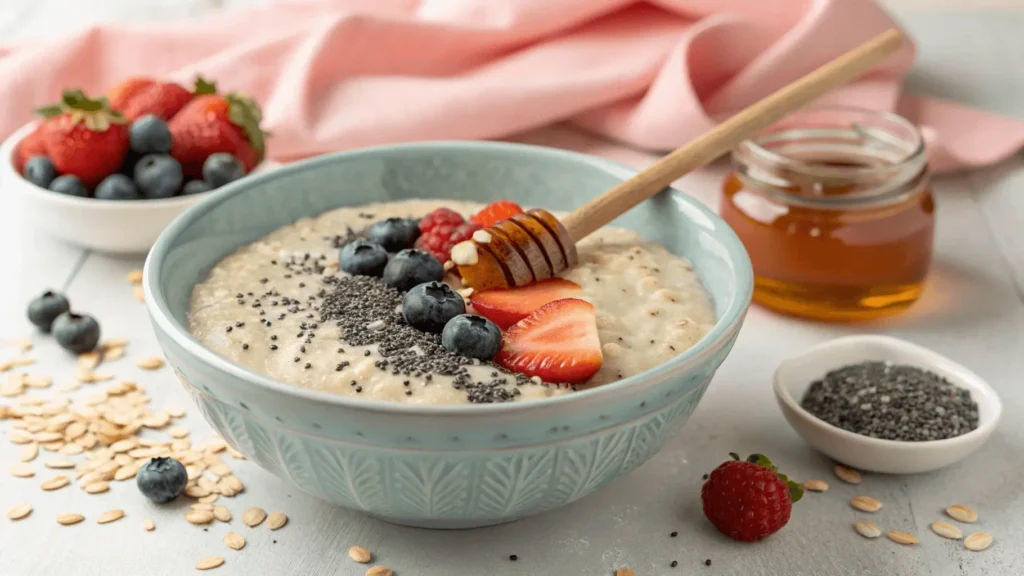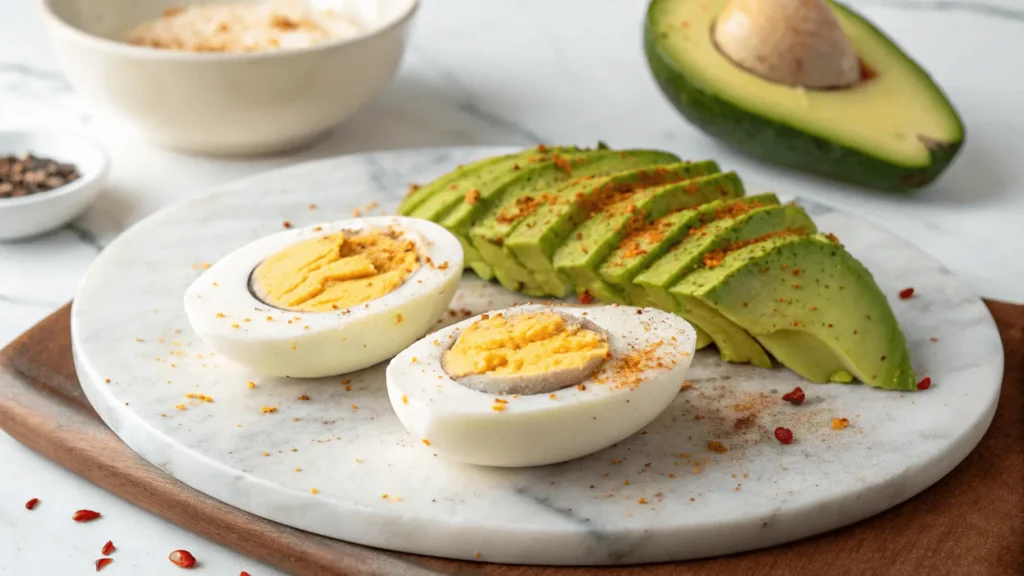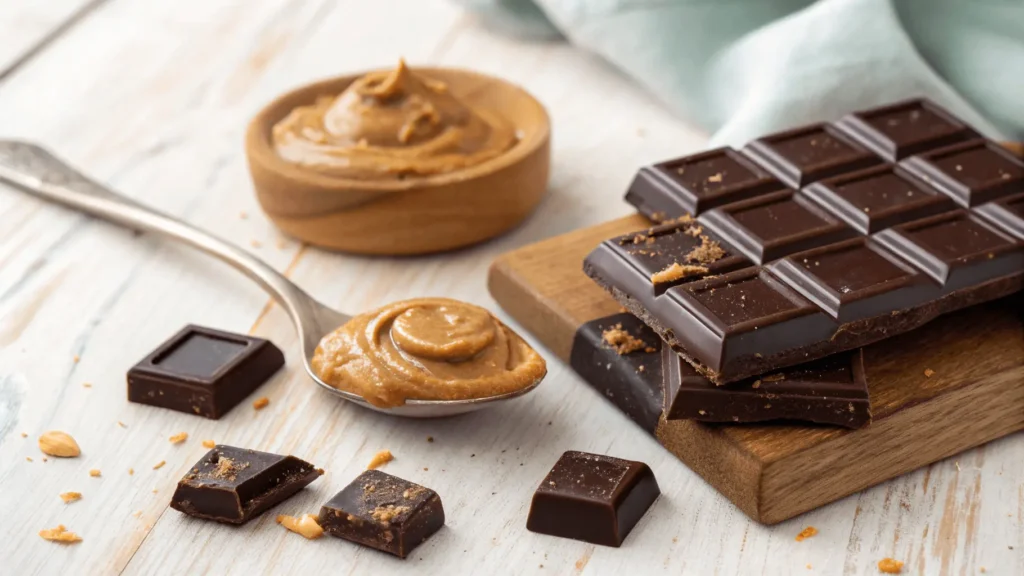Table of Contents
Late-night hunger cravings can be tricky. Eating too much or the wrong foods before bed can lead to weight gain and disrupt your sleep. However, choosing the right bedtime snacks can actually help with weight loss and improve sleep quality.
The key is selecting nutrient-dense, low-calorie foods that keep you full and support your body’s natural sleep cycle. In this guide, we’ll explore eight healthy bedtime snacks that not only satisfy your cravings but also help you burn fat while you sleep.
1. Greek Yogurt with Honey
Greek yogurt is a fantastic late-night snack because it’s high in protein and low in sugar (when you choose the unsweetened kind). The casein protein in Greek yogurt digests slowly, keeping you full throughout the night while also aiding muscle recovery.
Adding a drizzle of honey not only enhances the flavor but also provides natural sugars that help regulate blood sugar levels. Plus, honey contains small amounts of tryptophan, an amino acid that promotes relaxation and better sleep.
Ingredients:
- 1 cup unsweetened Greek yogurt
- 1 teaspoon raw honey
- A pinch of cinnamon (optional)
Nutritional Analysis (Per Serving):
- Calories: 150
- Protein: 15g
- Carbs: 12g
- Fat: 4g
Cooking Tips and Tricks:
- Opt for full-fat Greek yogurt for a creamier texture and better satiety.
- Drizzle honey instead of mixing it in to get a natural sweetness burst.
- Add a pinch of cinnamon for extra metabolism-boosting properties.
2. Almonds and Walnuts
Nuts like almonds and walnuts are rich in healthy fats, magnesium, and melatonin—all of which are essential for good sleep. Magnesium is known to relax muscles and calm the nervous system, making it easier to fall asleep.
Walnuts, in particular, contain tryptophan and omega-3 fatty acids, which contribute to serotonin production—helping you relax and drift into deep sleep. Just be mindful of portion sizes, as nuts are calorie-dense.

Ingredients:
- 10 almonds
- 5 walnut halves
- 1 teaspoon flaxseeds (optional)
Nutritional Analysis (Per Serving):
- Calories: 180
- Protein: 5g
- Carbs: 6g
- Fat: 15g
Cooking Tips and Tricks:
- Dry roast the nuts for added crunch and enhanced flavor.
- Store in an airtight container for a grab-and-go snack.
- Soak almonds overnight to improve digestion and nutrient absorption.
3. Cottage Cheese with Berries
Cottage cheese is another great bedtime snack because it’s packed with casein protein, which digests slowly and keeps you full. It also contains amino acids that help muscle recovery overnight.
Pairing it with antioxidant-rich berries like blueberries or raspberries adds natural sweetness and fiber, which helps balance blood sugar levels. The antioxidants in berries also fight inflammation and promote overall health.
Ingredients:
- ½ cup cottage cheese
- ¼ cup mixed berries (blueberries, raspberries, or strawberries)
- 1 teaspoon chia seeds
Nutritional Analysis (Per Serving):
- Calories: 120
- Protein: 14g
- Carbs: 10g
- Fat: 3g
Cooking Tips and Tricks:
- Use full-fat cottage cheese for extra creaminess.
- Mash the berries slightly to release their natural sweetness.
- Sprinkle chia seeds for added fiber and omega-3s.
4. Oatmeal with Chia Seeds
Oatmeal isn’t just for breakfast! A small bowl of oatmeal before bed can actually help you sleep better. Oats contain complex carbohydrates that stimulate serotonin production, helping you relax.
Adding chia seeds boosts fiber content, keeping you full and preventing late-night hunger cravings. Chia seeds also contain omega-3s, which support brain health and overall well-being.

Ingredients:
- ½ cup rolled oats
- 1 teaspoon chia seeds
- 1 cup almond milk
- 1 teaspoon maple syrup (optional)
Nutritional Analysis (Per Serving):
- Calories: 200
- Protein: 6g
- Carbs: 32g
- Fat: 5g
Cooking Tips and Tricks:
- Prepare overnight oats by soaking them in almond milk for a no-cook option.
- Add a dash of cinnamon or nutmeg for extra flavor.
- Use steel-cut oats for a chewier texture and longer-lasting satiety.
5. Banana with Peanut Butter
Bananas are a natural source of magnesium, potassium, and tryptophan, all of which promote muscle relaxation and sleep. The natural sugars in bananas also provide a steady source of energy without causing blood sugar spikes.
Pairing bananas with a tablespoon of natural peanut butter adds healthy fats and protein, making this snack even more satisfying. Just make sure to use a peanut butter that has no added sugars or oils.
Ingredients:
- 1 small banana
- 1 tablespoon natural peanut butter
Nutritional Analysis (Per Serving):
- Calories: 180
- Protein: 5g
- Carbs: 28g
- Fat: 7g
Cooking Tips and Tricks:
- Use frozen banana slices for a creamy, ice-cream-like treat.
- Spread peanut butter evenly to avoid overconsumption.
- Choose unsweetened peanut butter to keep sugar intake low.
6. Hard-Boiled Eggs with Avocado
Eggs are a powerhouse of protein, healthy fats, and essential vitamins. They are low in calories yet highly satisfying, making them a great choice for weight loss.
Avocado, on the other hand, is rich in fiber and heart-healthy monounsaturated fats. The combination of eggs and avocado provides steady energy release, preventing late-night hunger pangs and keeping blood sugar levels stable.

Ingredients:
- 2 hard-boiled eggs
- ½ avocado, mashed
- A pinch of sea salt and black pepper
Nutritional Analysis (Per Serving):
- Calories: 250
- Protein: 14g
- Carbs: 6g
- Fat: 20g
Cooking Tips and Tricks:
- Use slightly ripe avocado for a smooth, buttery texture.
- Sprinkle with paprika or chili flakes for a flavor boost.
- Prepare eggs in advance for a quick, easy snack.
7. Herbal Tea with Whole-Grain Crackers
If you’re looking for a light snack, herbal tea with whole-grain crackers is a great option. Herbal teas like chamomile, peppermint, or valerian root have natural calming effects that can help you unwind before bed.
Whole-grain crackers provide complex carbs that keep your energy levels stable without causing insulin spikes. They also promote serotonin production, helping you relax and sleep better.
Ingredients:
- 1 cup herbal tea (chamomile, peppermint, or valerian root)
- 3 whole-grain crackers
- 1 teaspoon hummus (optional)
Nutritional Analysis (Per Serving):
- Calories: 100
- Protein: 3g
- Carbs: 18g
- Fat: 2g
Cooking Tips and Tricks:
- Steep herbal tea for at least 5 minutes for a stronger calming effect.
- Pair crackers with hummus for extra flavor and protein.
- Avoid caffeine-containing teas, as they may disrupt sleep.
8. Dark Chocolate with Almond Butter
Craving something sweet? A small piece of dark chocolate paired with a teaspoon of almond butter can be a satisfying yet healthy dessert.
Dark chocolate is rich in antioxidants and contains serotonin-boosting compounds that improve mood and relaxation. Almond butter provides healthy fats and protein, keeping you full without excessive sugar intake.

Ingredients:
- 1 square (1 oz) dark chocolate (70% cocoa or higher)
- 1 teaspoon almond butter
Nutritional Analysis (Per Serving):
- Calories: 150
- Protein: 3g
- Carbs: 10g
- Fat: 12g
Cooking Tips and Tricks:
- Melt dark chocolate and drizzle over almond butter for a decadent touch.
- Choose high-quality dark chocolate for the best antioxidant benefits.
- Avoid milk chocolate, as it contains added sugars.
Tips for Healthy Bedtime Snacks
- Keep Portions Small: Overeating, even healthy foods, can interfere with sleep and digestion.
- Eat at Least 30–60 Minutes Before Bed: This allows your body to digest the food properly.
- Avoid Sugary and Processed Snacks: These can cause blood sugar spikes and disrupt sleep patterns.
Conclusion
Choosing the right bedtime snacks can support weight loss and improve sleep quality. By opting for nutrient-dense foods like Greek yogurt, almonds, cottage cheese, and bananas, you can curb cravings without sabotaging your health goals.
Make sure to keep portions in check and avoid processed, high-sugar foods. With the right choices, you can enjoy a satisfying late-night snack that helps you wake up refreshed and ready to take on the day.
FAQs
1. Can I eat snacks before bed without gaining weight?
Yes! As long as you choose low-calorie, nutrient-dense snacks and practice portion control, bedtime snacking can support weight loss.
2. What foods should I avoid before bed?
Avoid sugary snacks, caffeine, and processed foods, as they can disrupt sleep and cause weight gain.
3. How long before bed should I eat a snack?
It’s best to eat a snack 30–60 minutes before bed to allow proper digestion.
4. Are high-protein snacks good for sleep?
Yes! Protein-rich snacks like Greek yogurt and eggs help muscle recovery and prevent late-night hunger.
5. Is dark chocolate a good bedtime snack?
Yes, in moderation! Choose dark chocolate with at least 70% cocoa for the best health benefits.
Here are some scientific references supporting the health and nutritional information presented in the article:
- Impact of Nighttime Snacking on Metabolism:
- A study published in the American Journal of Physiology-Endocrinology and Metabolism examined the effects of nighttime snacking on energy metabolism. The findings indicated that consuming snacks late at night decreased fat oxidation and increased LDL cholesterol levels in healthy young women, suggesting that late-night eating may alter fat metabolism and elevate the risk of obesity. PubMed
- Role of GABA in Sleep Promotion:
- Research highlighted in The Guardian discusses gamma-aminobutyric acid (GABA), a neurotransmitter that acts as the brain’s “off switch.” GABA is associated with promoting relaxation and improving sleep quality. The article explores various products designed to enhance GABA levels to aid in better sleep and reduce anxiety. Le Guardian
- Foods to Avoid Before Bedtime:
- An article from Real Simple outlines specific foods that can disrupt sleep if consumed before bedtime. These include chocolate (due to caffeine and sugar content), caffeinated teas, carbonated beverages, aged cheeses containing tyramine, citrus fruits that may cause acid reflux, alcohol, spicy dishes, and high-fat foods like ice cream. Avoiding these can enhance sleep quality. Simple et Réel
- Sleep and Weight Loss Connection:
- An article from Healthline discusses the relationship between sleep and weight loss. It highlights that adequate sleep can help regulate appetite, reduce late-night snacking, and support metabolic health, all of which are crucial for weight management. Healthline
- Low-Glycemic Index Foods and Appetite Control:
- Insights from The New York Post emphasize that consuming low-glycemic index foods, such as almonds, can help control hunger by providing steady energy release. This approach aids in reducing cravings and supports weight loss efforts. New York Post
These references provide scientific backing for the recommendations and information presented in the article on healthy bedtime snacks that support weight loss and improve sleep quality.

